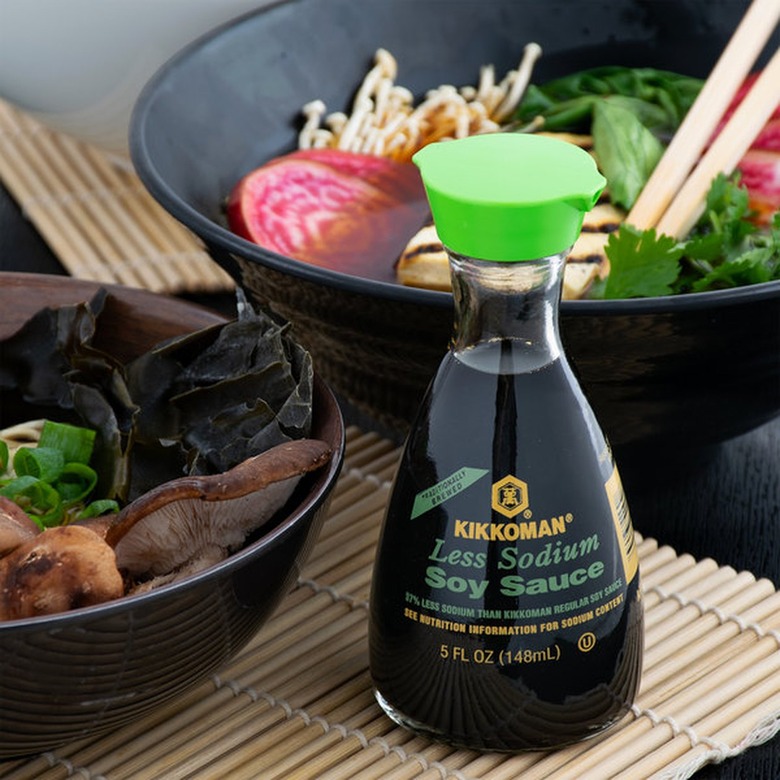You May Want To Reconsider How You Store Your Soy Sauce
Whether it's used in a marinade, stir-fry, homemade teriyaki sauce, or egg dish or as a dipping sauce for dumplings, egg rolls, or sushi, soy sauce can add the perfect umami flavor to your favorite foods. But after you break open a new bottle, what are you supposed to do with it? Does soy sauce need to be refrigerated? Usually, it does not, but there are some exceptions depending on the variety.
Fortunately, with the help of Dr. Bryan Quoc Le, food chemist, food and beverage industry consultant, and author of 150 Food Science Questions Answered, we can help you determine how best to store your soy sauce, how long it lasts, and how to tell if it's gone bad.
Does Soy Sauce Need to Be Refrigerated?
"Soy sauce can be kept outside of the refrigerator so long as it is not low-sodium soy sauce," Dr. Le tells Hunker. "That's because conventional soy sauce contains enough salt, about 16% to 18%, to prevent the growth of most spoilage and all pathogenic microorganisms." Low-sodium soy sauce has anywhere from around 35% to 75% of the salt removed after it is brewed, reducing its ability to stay fresh outside the refrigerator.
The fermentation process used to make soy sauce also increases its shelf life, as Dr. Le explains that it "relies on an edible mold known as koji to break down the soybeans naturally. The digested mash from the koji is then allowed to ferment with yeast and lactic acid bacteria." Like many fermented foods, this process was developed to help keep food fresh long before refrigeration was invented, and it is effective. "The koji mold, lactic acid bacteria, and yeast produce antimicrobial compounds that keep the soy sauce from being infected by other microorganisms," says Dr. Le.
Avoid Low-Quality Soy Sauce
While most full-sodium soy sauces are resistant to the growth of microorganisms, some low-quality sauces bypass the fermentation process, making them more prone to spoilage. Dr. Le says that "low-quality soy sauces are usually produced by hydrolyzing soybeans using enzymes or hydrochloric acid rather than the traditional fermentation process," meaning they do not contain the antimicrobial properties of traditional soy sauces.
If you're unsure if you have traditionally prepared soy sauce or a low-quality version, check the ingredients. "High-quality soy sauce will not contain any preservatives, hydrolyzed protein, or added natural flavorings," says Dr. Le, adding that soy sauce should be fermented for at least one year and the longer, the better since "these soy sauces are very resistant to spoilage."
How Long Does Soy Sauce Last?
If you buy a high-quality soy sauce, it will last nearly indefinitely regardless of whether it is stored in the cupboard or the refrigerator. On the other hand, low-quality or low-sodium versions left out on the counter will start to go bad somewhere between a few months and a year after they are opened. If these products are refrigerated, expect them to last up to two to three years.
Does Soy Sauce Go Bad?
Again, it depends on the product. "High-quality soy sauce retains much of its strength and flavor over time," says Dr. Le, "but reduced-sodium and low-quality products still do not 'go bad' in the traditional sense [and] can continue to be used even if the flavor is off." While they may not make you sick when they start to spoil, they may lose their flavor or taste bitter or metallic.
What About Gluten-Free Soy Sauce?
Most traditional soy sauces contain wheat, but gluten-free tamari and other wheat-free soy sauces are otherwise made using the same process and are therefore subject to the same storage rules. High-quality, wheat-free soy sauces can be left out without fear of spoilage, while those low in sodium or containing preservatives, hydrolyzed protein, or natural flavorings should be stored in the fridge.
Note that liquid coconut aminos, a gluten-free, soy-free alternative to soy sauce, is made using a different process than soy sauce and should be refrigerated after opening.
